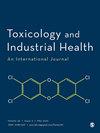Ascorbic acid attenuates gasoline-induced testicular toxicity, sperm quality deterioration, and testosterone imbalance in rats
IF 1.7
4区 医学
Q3 PUBLIC, ENVIRONMENTAL & OCCUPATIONAL HEALTH
引用次数: 0
Abstract
The present study evaluated the protective effect of ascorbic acid (ASCB) against gasoline fumes (PET) induced testicular oxidative stress, sperm toxicity, and testosterone imbalance in Wistar rats. Twenty-four (24) male albino rats (75 ± 16 g) were randomized into three experimental groups ( N = 8). The control group: received normal saline, PET group: exposed to PET 6 h daily by inhalation in an exposure chamber and PET + 200 mg ASCB/kg body weight group: exposed to PET 6 h daily by inhalation and administered ASCB per os. Treatment of ASCB and PET exposure was done thrice and five times weekly for a period of 10 weeks respectively. ASCB co-treatment prevented PET-induced increases in the oxidative stress markers (glutathione, glutathione S-transferase, superoxide dismutase, catalase, hydrogen peroxide generation, nitric oxide, and lipid peroxidation) and serum testosterone concentration ( p < .05). Sperm quality was low and those with damaged heads and tails increased alongside histological injuries in the PET-exposed rats, which were also minimized with ASCB administration. ASCB protected against PET-induced oxidative stress, sperm, and testis damage in rats.抗坏血酸可减轻汽油引起的大鼠睾丸毒性、精子质量下降和睾酮失衡
本研究评估了抗坏血酸(ASCB)对汽油烟雾(PET)诱导的 Wistar 大鼠睾丸氧化应激、精子毒性和睾酮失衡的保护作用。将 24 只雄性白化大鼠(75 ± 16 克)随机分为三个实验组(N = 8)。对照组:接受普通生理盐水;PET 组:每天在暴露室中吸入 PET 6 小时;PET + 200 毫克 ASCB/kg 体重组:每天吸入 PET 6 小时,同时每只大鼠服用 ASCB。ASCB治疗和PET暴露每周分别进行三次和五次,为期10周。ASCB 联合治疗可防止 PET 诱导的氧化应激指标(谷胱甘肽、谷胱甘肽 S-转移酶、超氧化物歧化酶、过氧化氢生成、一氧化氮和脂质过氧化)和血清睾酮浓度的增加 ( p < .05)。PET 暴露大鼠的精子质量较低,头部和尾部受损的精子数量与组织学损伤同时增加,而服用 ASCB 可将这些损伤降至最低。ASCB 对 PET 诱导的大鼠氧化应激、精子和睾丸损伤有保护作用。
本文章由计算机程序翻译,如有差异,请以英文原文为准。
求助全文
约1分钟内获得全文
求助全文
来源期刊
CiteScore
3.50
自引率
5.30%
发文量
72
审稿时长
4 months
期刊介绍:
Toxicology & Industrial Health is a journal dedicated to reporting results of basic and applied toxicological research with direct application to industrial/occupational health. Such research includes the fields of genetic and cellular toxicology and risk assessment associated with hazardous wastes and groundwater.

 求助内容:
求助内容: 应助结果提醒方式:
应助结果提醒方式:


